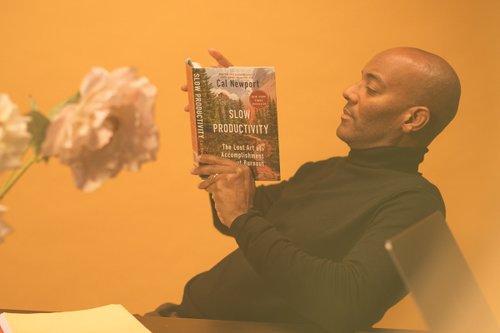From battlefields to bad bosses: Fostering resilience in the workplace
Jun 26, 2024
9 mins


Journalist and translator based in Paris, France.
We treat work like a combat zone, and it shows in the way we speak: “talent wars,” “the return-to-office battle,” and “resilience training.” We talk as if work, like war, is a painful experience inextricably baked into human civilization. Rarely do we discuss our jobs as if they’re a source of peace or a respite from life’s hardships.
However, Brigadier General Mandy Birch believes the future of work hinges on changing this notion. As a leader in the US Air Force and a Silicon Valley veteran, Birch’s CV is riddled with high-stress situations: commanding a counterterrorism operation in Sub-Saharan Africa, managing 176 Air Force bases worldwide, acting as a senior executive in a quantum computing start-up, and biking 4,000 miles across America — for fun. While far removed from the anti-work movement, Birch has seen the systemic problems causing workers grief and burnout from up close. She shares her advice on surviving hardship, how things can change, what she plans to do about it, and what you can do too.
You’ve recently been selected as a brigadier general in the US Air Force Reserve, you currently manage a team of over 50,000 military engineers, and you’re starting your own company. Why are you adding this entrepreneurial endeavor to your already hectic schedule?
I started TreQ because I saw an opportunity. How a company is run is as important as what it does. Instead of advising people on how to do that, I decided to try to show the world that these ideas could work, and I wanted to do that with an emerging technology that could reshape the world for better or for worse, depending on how the capability is developed. So, I’m starting a company building quantum computers.
What are the ideas you’d like to showcase with your company?
For starters, every employee should earn a living wage and when employees create value, they should share that value in a more generous way. We must consider all stakeholders, particularly in technology development. Quantum computing will make a profound impact on the world, and we must have a stewardship mindset not only for investors and financial returns, but for all stakeholders: the employees, the supply chain, the customers, the communities where these companies are located, and how their presence affects communities. It’s important to figure out our stance on these issues from the beginning to create a culture that values the people and resources entrusted to us.
We also have to be intentional about diversity. It’s vital in tech because you’re creating technologies that have a powerful effect on our world. Today, we understand the principles of quantum physics — they’re powerful — and we’re now figuring out how to engineer with them. Quantum computers could help us find a cure for Alzheimer’s, for instance. They will run mathematical models that are too complex for computers as we know them. Today, for example, to create a new pharmaceutical therapy, we have to do time-consuming wet chemistry experiments in a lab. We anticipate that quantum computers will enable us to simulate many permutations prior to laboratory work to speed up finding cures for diseases.
In the digital revolution, women programmers helped launch the industry, and then the field became less diverse over time. Now, we also see that some of our societal risks originate from giant companies that are often more economically powerful than nations. With more thoughtful, deliberate, intentional company-building from the very beginning, we can identify risk factors like these and take them into account in the way that we develop technology in the future. In the quantum industry, we don’t need just PhDs doing these jobs — we need more engineering work. We have the opportunity to bring in and train technicians from a variety of backgrounds.
Can you give an example of how you see these ideas playing out?
Take employee compensation, for example. I want to be upfront with employees when they join about what our compensation philosophy is and give them the flexibility to choose between different employment packages that are calculated from clear data and methodologies. This transforms employment negotiation into a decision that helps eliminate pay gaps. People can choose: “I want more equity and less cash,” or “I have a young family, I just took out a mortgage, and I want more cash.” A lack of choice and influence — that’s one of the biggest stressors that we ever face in the workplace. Giving people choices in as many ways as possible reduces stress and increases productivity and retention.
Another example is how teams are formed, led, and managed. We should allow for career paths where people can step in and out of leadership and management roles. Not everyone enjoys leading people, but someone could run a project for a few weeks, see if they enjoy that type of activity, be compensated for the success of the team, and allow all the teammates to share in the value they create. Why not create two pathways for career progression, with many on and off ramps between the two, that are equally valuable — whether that’s an individual contributor path or a management path — so employees don’t feel they are stuck in one or the other?
On your website, you discuss the struggles you’ve faced. How do you turn tough experiences into agents for change?
We can all choose how we frame the difficulties that we’re facing. We can think of ourselves as a victim who must accept adversity or as a victor who has agency over the choices we can make. We can’t always do this reframing on our own — a lot of it depends on the environment that you’re in. I have a lot less fear when I’m mindful that my identity is not defined by how I perform at work. This mindset gives a huge amount of freedom in the way that you approach challenges. When work isn’t the first thing that defines you, you can risk failure and branch into something you may not have had the confidence to do before.
I’ve been fired from a job. It was scary, but I quickly began feeling relief from the difficult work environment I had been enduring: within a week, a lot of people reached out to help me find the next opportunity. These relationships are so much more important than our career path overall because those folks will be there for you as you make career transitions, whether they are forced or voluntary. A military background means you move a lot, which teaches you to jump into a new environment and make friends quickly. I take this approach in a new job as well — building relationships matters as much as the work you do because most of us can’t do our jobs on our own. I don’t worry too much because I’ve learned I do have something to offer, I don’t have to be able to do everything and, most importantly, I can reach out to somebody else for help with things that aren’t my strongest suit.
In 2018, I deployed to Chad with the French military. I was the U.S. military liaison officer to the counter-terrorism mission Operation Barkhane in the Sahel and Sahara. I also led the coordination cell supporting the counter-Boko Haram mission of the Lake Chad Basin Commission’s Multinational Joint Task Force. The region was and is struggling with simultaneous environmental, governmental, employment, and religious clashes. I saw terrible things on a daily basis with my team, supporting and encouraging my teammates to work through some of the most tragic things imaginable. I think, again, it came down to being a team and pulling together.
How would you compare the employment problems you saw in the Sahel and Silicon Valley?
It was an interesting transition when I came back from Chad to Silicon Valley. My military team saw death and violence while working on critical problems that involve human beings and their behavior. We saw people losing lives, limbs, and livelihoods on a regular basis. There’s a different type of stress in the work environment where it’s more about being fulfilled, pursuing your dreams, and using your talents and strengths. It’s about emotional days when there’s a reduction in the workforce and people getting laid off.
There is trauma in both circumstances that requires care. Both challenges feel extremely difficult when you’re facing them. A national security perspective gives me a bit of a more even keel. When someone’s upset I can ask myself, “Will anyone die?” It’s hard to be anxious when you’re grateful. It’s so helpful to put things in perspective and think, “What do I have?” Often when we’re upset, it’s because of a sense of loss over something – a dream, a capability, a job. So, being able to put into perspective what you do have can help reframe the situation that you’re in.
Some people argue that individuals shouldn’t shoulder the responsibility of adapting to a broken system. What would you say to workers who reject the idea of resilience training?
It comes down to individuals caring for people. This is deeply baked into me from my military leadership training, which is very different from what I experienced in Silicon Valley. In the military, you always have to be ready to go on worldwide, no-notice missions, so you have to be concerned about people, their families, and their health. We report on these things because they affect our teams’ readiness to serve. I came to Silicon Valley with this expectation that we must care about one another and that we can’t accomplish our mission at work any more than a military unit can accomplish a deployment if people aren’t well, but power is glorified in Silicon Valley. Power isn’t a bad thing, but it can be weaponized and used to manipulate people instead of edifying the team and mission. Silicon Valley CEOs are often glorified for behaviors that don’t recognize the dignity of human beings and for overstepping boundaries.
In one of my jobs as a military commander, every morning I’d hear about what was going on with people’s lives in our unit. Someone lost a child, or their parent was diagnosed with cancer, or they were facing a divorce. You realize you just don’t know what someone’s facing when they come to work. I want work to be a place where people can have some degree of refuge from the struggles they’re facing in life. It should be a place where they can put their strengths and skills to work as part of a team and become part of something bigger than themselves. Training doesn’t necessarily change people. People’s lives are changed by colleagues who care, and leaders should set the culture in a company. So, I’m not sure I would disagree with someone who rejects that resilience training.
You don’t have to be a manager, though, to contribute to the culture at your company. You can ask questions and genuinely listen to let colleagues know that you care. You don’t have to pry, but you can ask questions like: “How was your weekend? Do you feel like you’re part of this team, or that you’re working on something you care about?” You don’t have to be in a leadership role to do that.
What are your tips for combating burnout?
Rest. Every January, people set ambitious goals, but how many people have rest and replenishment resolutions? This has transformed my life. I put boundaries on my days so that I have daily and weekly cycles of rest. When I get a good night’s sleep or take a hike in the woods, I think more clearly and suddenly find solutions to the problems I’ve been working on. It’s not about the number of hours we work but our capability, energy, and presence when we’re there. I know it feels like a luxury when you’re in hard situations, or have family responsibilities, but one thing we have control over is the rest and replenishment we get.
What are the most frustrating mistakes you see companies make?
The most tragic mistake I see is companies not cultivating a stewardship mindset, and this appears in multiple ways. First, not being honest with employees about their value to a company. Employees choose to invest a huge portion of their lives at work. Some people take on risks for their employer and deserve to be compensated for that. Companies have a responsibility to align employees’ work to unlock their collective talent and potential. Industrial-era employment practices that simply hold employees accountable tend to fuel anxiety in knowledge workers…and aren’t very effective.
More globally, companies don’t always establish clear values. How we accomplish a mission is just as important as what we accomplish. If we accomplish something great and destroy people in the process, it’s not really that great, and it doesn’t create sustainable, long-term value. Clear values lead to frank conversations and being able to raise tough issues — it’s dishonest not to do that.
An example is becoming too hierarchical when it comes to getting inputs for major decisions. Every leader needs to understand what’s going on at the grassroots level where their decisions affect other people. I’ve sometimes seen a lack of diligence in important decision-making. Repercussions could be mitigated with important conversations before big choices are made.
What common mistakes do teammates and employees make?
Expecting people to have the same strengths and skills as you, and then getting frustrated when you see different strengths and skills and struggle to build trust. It’s harder to manage a diverse team with different strengths and skills, but you lose so much of your potential when everybody on your team is just like you. Surrounding yourself with people who are clones, and being frustrated and discouraged by the challenge of bringing together diverse people, is one of the biggest mistakes that teams make. For employees, it’s not embracing the personal responsibility to make a difference where they can. Sometimes people expect managers to make all the changes, but everyone can demonstrate change just by implementing it yourself.
In your opinion, what’s the solution to fixing a “broken system”?
It comes down to character, values, and caring about those you interact with, whether that’s in your workplace, your home, your neighborhood, or your community. Even when you go to the grocery store — just commit to being grateful and kind.
Photo: Thomas Descamps for Welcome to the Jungle
Follow Welcome to the Jungle on Facebook, LinkedIn, and Instagram, and subscribe to our newsletter to get our latest articles every week!

More inspiration: Future of Work

The Bear: When professional passion turns toxic
Carmy's workplace trauma isn't unique...
Dec 31, 2024

The youth have spoken: South Korea’s push for a four-day workweek
Is this the end of Korean hustle culture?
Dec 26, 2024

Cal Newport's Slow Productivity: Redefining success in a hustle culture
Is slowing down the key to achieving more?
Dec 19, 2024

Wellbeing washing: Are workplace mental health apps doing more harm than good?
Workers are struggling with mental health. Are employers approaching it the right way?
Dec 19, 2024

Dark side of DINKs: Working as a childfree adult
Having children comes with challenges. So does choosing not to.
Dec 11, 2024
Inside the jungle: The HR newsletter
Studies, events, expert analysis, and solutions—every two weeks in your inbox

